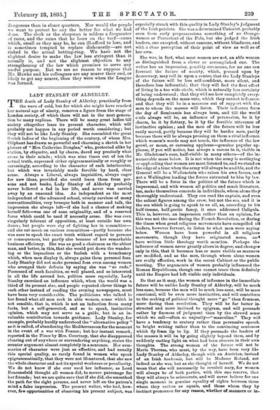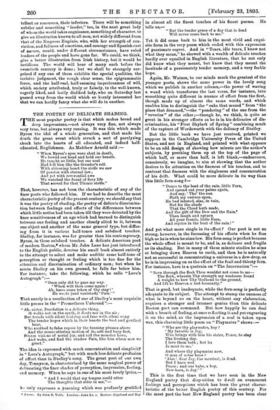LADY STANLEY OF ALDERLEY.
THE death of Lady Stanley of Alderley, practically from the wave of cold, but for which she might have reached her natural age of ninety, removes a figure from the stage of London society, of which there will not in the next genera- tion be many replicas. There will be many great ladies till society altogether loses its present character, which will probably not happen in any period worth considering ; but they will not be like Lady Stanley. She resembled the great Ssotch ladies of the beginning of the century, of whom Mrs. Oliphant has drawn so powerful and charming a sketch in her picture of "Mrs. Catherine Douglas," who, protected alike by station, by etiquette, and by charm, dared say precisely what arose in their minds ; which was nine times oat of ten the actual truth, expressed either epigrammatically or roughly or caressingly, according to the character of each interlocutor, but which was invariably made forcible by hard, clear sense. Always a Liberal, always inquisitive, always eager for new ideas, provided she could learn them from per- sons and not books, Lady Stanley of Alderley probably never believed a fad in her life, and never was carried away by an unsound idea. As independent as the most independent of the advanced school, utterly careless of many conventionalities, very brusque both in manner and talk, the impression she always left—if she had a chance of making herself felt—was one of sane originality, and of a reserved force which could be used if necessity arose. She was even singularly tolerant of opposition, at least outside her own doors ; but people were shy of fighting her in committee— and she sat much on various committees—partly because she was sure to speak the exact truth without regard to persons or consequences, but partly also because of her remarkable business efficiency. She was as good a chairman as the ablest man, and better, in this, that she would put down the wander- ing or the loquacious or the foolish with a trenchancy which, when men display it, always gains them personal foes. Lady Stanley did not make personal foes even among women who avenged their defeats by saying she was "so rude." Possessed of such faculties, so well placed, and so interested in all the life around her, polities more especially, Lady Stanley exercised an influence which, when the world was a third of its present size, and people repeated clever things to each other instead of reading the evening newspapers, must have been very considerable. The politicians who talked to her found what all men seek in able women, sense which is not sensible, that is, which is not an induction from many facts, but a self-generated, and so to speak, instinctive opinion, which may not serve as a guide, but is an in- valuable contribution towards guidance. Lady Stanley, for example, probably hardly understood the "alternative policy" as it is called, of abandoning the Mediterranean for the moment in the event of a war with France; but her instant remark, reported in the Times by Mrs. Courtney, that she disapproved clearing out of anywhere or surrendering anything, states the counter argument almost completely in a sentence. Her sum- maries of character were just as effective, and had usually this special quality, so rarely found in women who speak epigrammatically, that they were not ill-natured, that she saw the whole character and not its special weakness or peculiarity. We do not know if she ever used her influence, as Lord Beaconsfield thought all women did, to secure patronage for her friends ; but we are quite sure that if she did, she smoothed the path for the right persona, and never left on the patron's mind a false impression. The present writer, who had, how- ever, few opportunities of observing his present subject, was
especially struck with this quality in Lady Stanley's judgment of the Irish patriots. She was a determined Unionist, probably even from early prepossessions something of an Orange. womanor Protestant of the Pale, but she judged the Irish leaders, one excepted, without rancour, without blindness, and with a clear perception of their point of view as well as of her own.
She was, in fact, what most women are not, an able woman as distinguished from a clever or accomplished one. The writer has an impression, possibly erroneous, for no one can forecast the future of society, which, pressed upon by democracy, may roll in upon a centre, that the Lady Stanleys of the future will be less self-confident, more silent, and therefore less influential; that they will feel the first effect of living in a too wide circle, which is naturally less certainty of being understood ; that they will see how completely every- thing depends on the mass-vote, which they cannot influence, and that they will be in a measure out of rapport with the men to whom the masses will listen. Their influence from the day of Semiramis has always been, and till the world caols always will be, an influence of persuasion, be it by charm, be it by flattery, be it by the forcible utterance of instinctive opinion ; and the men of the future will be less easily moved, partly because they will be harder men, partly because there will be always pressing on them a rival influence which women's words may not touch, the influence of the low growl, or moan, or caressing applause—genuine popular ap- plause, if you will notice, has always a caress in it, vieible in Mr. Gladstone's case, half-visible in many others—of the in- numerable mass below. It is not when the army is mutinying or appl iuding that women are most listened to, and we stand on the edge of a time when the army will always be audible, and the General will be a Wallenstein who raises his own forces, and not a Wellington leading the forces entrusted to him by law. There will be a force in the politics of the future which is impersonal, and with women all politics and much literature, too, make themselves concrete in individuals, whom alone they thoroughly understand. They can read the captain, and even the salient figures among the crew, but not the sea, and it is the sea which is going to speak to us all, as, according to his half-insane, half-poetic fancy, it once addressed Caligula. This is, however, an impression rather than an opinion, for this was not the case during the French Revolution, or during the times when great religious movements have compelled al leaders, however fervent, to listen to what men were saying below. Women have been powerful in all religious movements, though they have originated none, an' have written little theology worth mention. Perhaps the influence of women never greatly alters in degree, and changee. only in this, that it becomes less or more visible as manners are modified, and as the men, through whom alone women are really effective, work in the secret Cabinet or the public meeting. The arguments of women probably influenced the- Roman Republicans, though one cannot trace them definitely- until the Empire had left visible only individuals.
Be that as it may, the women of influence in the immediate future will be unlike Lady Stanley of Alderley, will be much less sane, because the men will be much less sane, will be more emotional, will be even more instinctive, and will contribute to the making of political thought more " go " than firmness, more daring than resolution. They will be far better in- structed and more inclined to epigram, and will persuade rather by fineness of judgment than by the shrewd sense which we call—often so unjustly—" masculine." They will. have a tendency to oratory rather than persuasive speech, to bright writing rather than to the convincing sentences which fly from lip to lip. If they persuade the leaders of the masses it will be by going slightly beyond them, and by suddenly casting light on what had been obscure in their own. thoughts. The strong woman of the future will not be Maria Theresa, who must, by the way, have been very like Lady Stanley of Alderley, though with an Austrian, instead of an Irish bonhomie, but will be Madame Roland, not indeed as she was, but as she thought of herself. We do not mean that she will necessarily be revoluti nary, for women. will always be of both parties, with this one reserve, that they will always be aristocrats, and will never believe for one single moment in genuine equality of rights between those whom they reckon as equals, and those whom they by instinct pronounce for any reason, whether of manners or in- tellect or resources, their inferiors. There will be something subtler and something "louder," too, in the next great lady of whom the world takes cognisance, something of character, to give an illustration known to all men, not widely different from that of the Empress Eugenie, who, with her strength of con- viction, and fullness of emotions, and courage and Spanish cast of nature, would, under d,fferent circumstances, have ruled leaders of the people and have gone far. We could, we think, give a better illustration from Irish history, but it would be invidious. The world will hear of many such before the twentieth century is done ; but we shall be strangely sur- prised if any one of them exhibits the special qualities, the incisive judgment, the rough clear sense, the epigrammatic force, and the half-real, half-seeming imperiousness of will, which society attributed, truly or falsely, to the well-known, eagerly liked, and lazily disliked lady, who on Saturday last passed away from the world which so keenly interested her that we can hardly fancy what she will do in another.



































 Previous page
Previous page